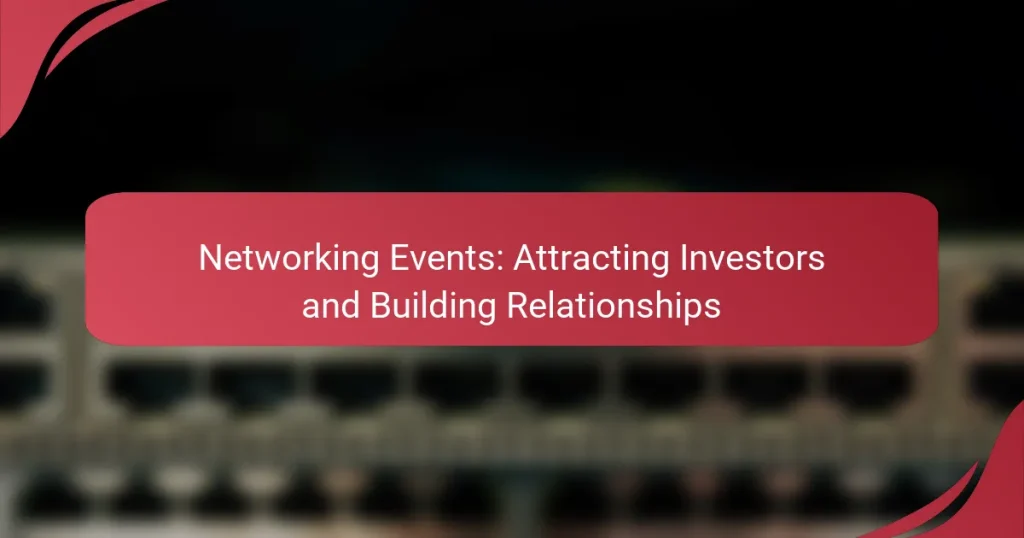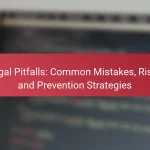Networking events serve as a vital platform for startups to attract investors and cultivate meaningful relationships within their industry. By facilitating direct engagement, these gatherings allow entrepreneurs to share their ideas and forge partnerships that can lead to successful collaborations. Utilizing effective networking strategies enhances the potential for building trust and rapport, essential elements in nurturing professional ties.
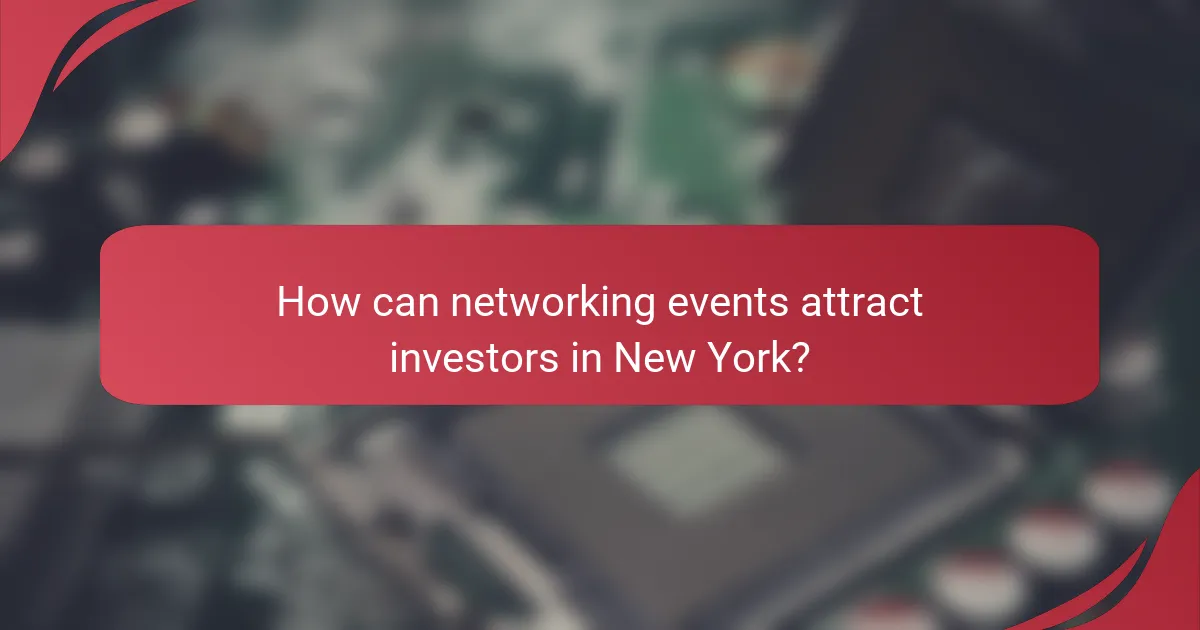
How can networking events attract investors in New York?
Networking events in New York can effectively attract investors by creating opportunities for direct engagement and relationship building. These events facilitate connections between entrepreneurs and potential investors, fostering an environment where ideas can be shared and partnerships formed.
Targeted guest lists
Creating targeted guest lists is crucial for the success of networking events aimed at attracting investors. By carefully selecting attendees who are relevant to the industry or sector, organizers can ensure that the right investors are present to meet entrepreneurs. This might include venture capitalists, angel investors, and industry experts who are actively seeking new opportunities.
Consider using platforms like LinkedIn to identify and invite potential investors who have shown interest in similar ventures. Tailoring invitations based on the interests and investment history of guests can significantly enhance the quality of interactions at the event.
Engaging presentations
Engaging presentations are essential for capturing the attention of investors during networking events. Presenters should focus on delivering concise, impactful pitches that highlight their business’s unique value proposition. Utilizing storytelling techniques can help make the presentation more relatable and memorable.
Incorporating visual aids, such as slides or videos, can enhance understanding and retention of information. Aim for a presentation length of around 10-15 minutes, allowing time for questions and discussions afterward to encourage investor engagement.
Follow-up strategies
Effective follow-up strategies are vital for maintaining connections made during networking events. After the event, sending personalized thank-you emails to investors can reinforce relationships and keep the conversation going. Include a brief recap of your discussion and any additional information that may be of interest to them.
Consider scheduling follow-up meetings or calls within a week of the event to capitalize on the momentum. Using a customer relationship management (CRM) tool can help track interactions and manage follow-up tasks efficiently, ensuring no valuable connections are overlooked.
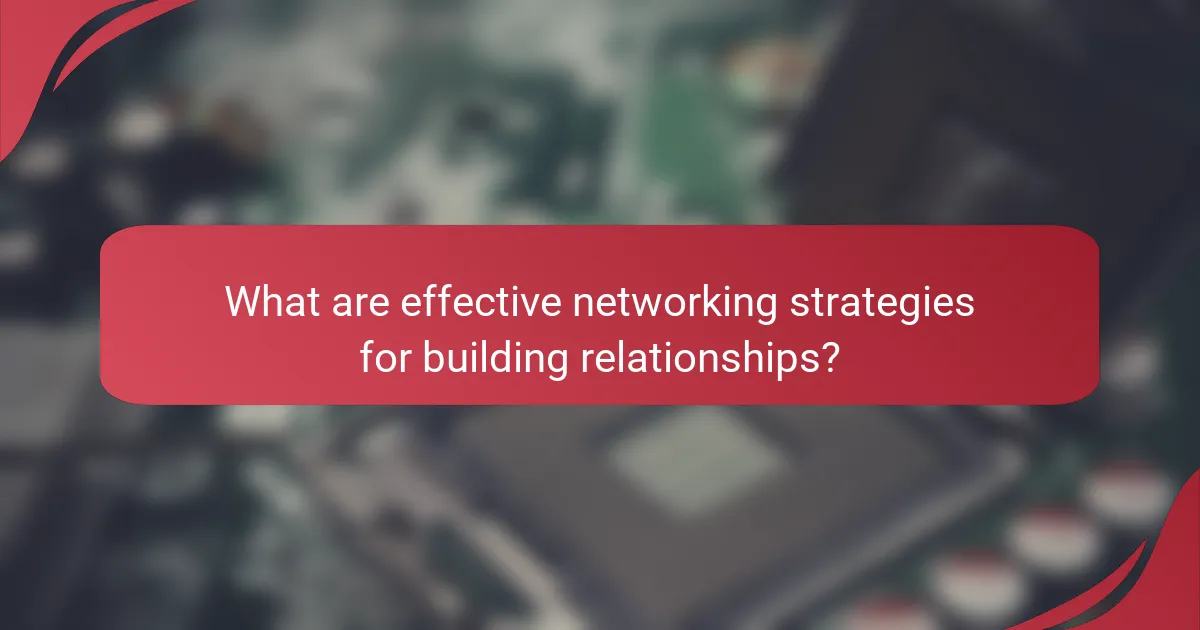
What are effective networking strategies for building relationships?
Effective networking strategies for building relationships focus on creating meaningful connections through personalized interactions and active engagement. These approaches foster trust and rapport, essential for attracting investors and nurturing professional ties.
Personalized introductions
Personalized introductions are crucial for establishing a strong first impression. Tailor your introduction to highlight shared interests or mutual connections, which can make the interaction more engaging. For instance, mentioning a common acquaintance or a relevant industry topic can spark immediate interest.
When introducing yourself, consider your audience’s background and interests. A well-crafted introduction can set the tone for a productive conversation, making it easier to transition into deeper discussions about potential collaborations or investments.
Active listening techniques
Active listening is an essential technique for building relationships during networking events. It involves fully concentrating on the speaker, understanding their message, and responding thoughtfully. This practice not only shows respect but also helps you gather valuable insights about their needs and interests.
To enhance your active listening skills, maintain eye contact, nod in acknowledgment, and ask open-ended questions. These strategies encourage the speaker to share more, allowing you to identify opportunities for collaboration. Avoid interrupting and focus on reflecting back what you’ve heard to confirm understanding.
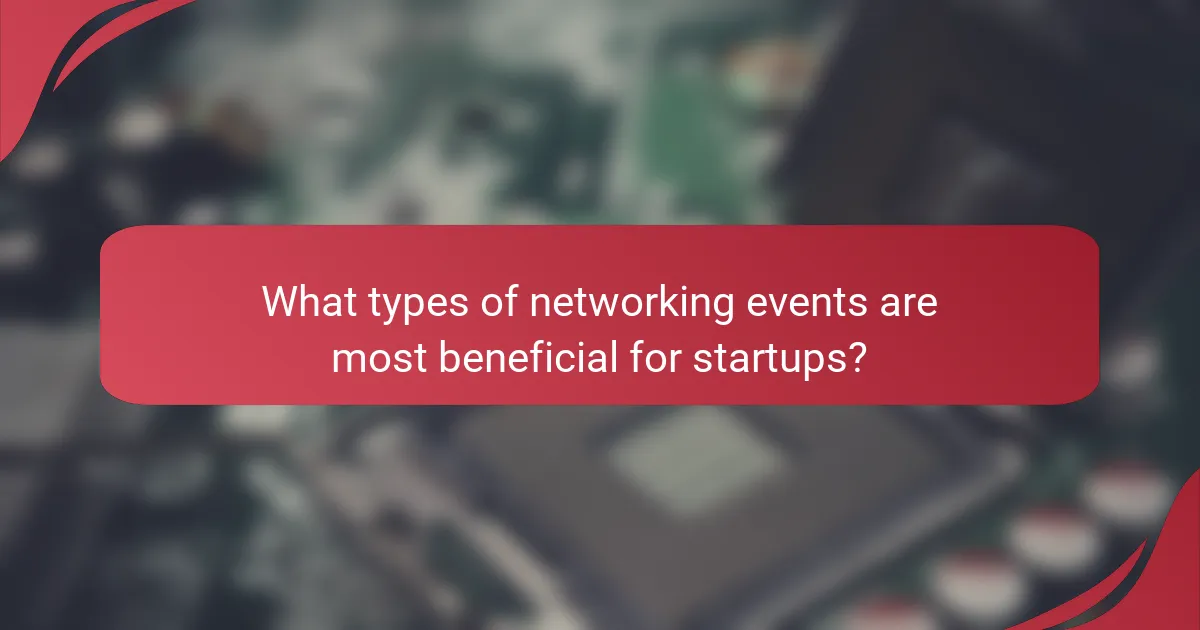
What types of networking events are most beneficial for startups?
Startups can greatly benefit from various networking events that facilitate connections with potential investors and industry peers. Key types include pitch competitions, industry conferences, and workshops or seminars, each offering unique opportunities for exposure and relationship building.
Pitch competitions
Pitch competitions are events where startups present their business ideas to a panel of judges, often including investors. These events provide a platform to showcase innovation and attract funding, with many competitions offering cash prizes or investment opportunities for winners.
To succeed, focus on delivering a clear and compelling pitch that highlights your value proposition. Research the competition format and tailor your presentation accordingly, ensuring you address potential investor concerns such as market viability and financial projections.
Industry conferences
Industry conferences gather professionals from specific sectors, providing a rich environment for networking. These events often feature keynote speakers, panel discussions, and breakout sessions that can enhance your industry knowledge while allowing for direct interaction with potential investors.
When attending, prepare by identifying key attendees you wish to connect with and have your business cards ready. Engage in discussions and follow up with contacts post-event to solidify relationships and explore potential collaborations.
Workshops and seminars
Workshops and seminars focus on skill development and knowledge sharing, often led by industry experts. These events can help startups refine their business strategies and learn best practices while connecting with like-minded entrepreneurs and investors.
Participate actively in discussions and exercises to maximize your learning and networking opportunities. Consider following up with participants and speakers to build relationships that could lead to future partnerships or investment opportunities.
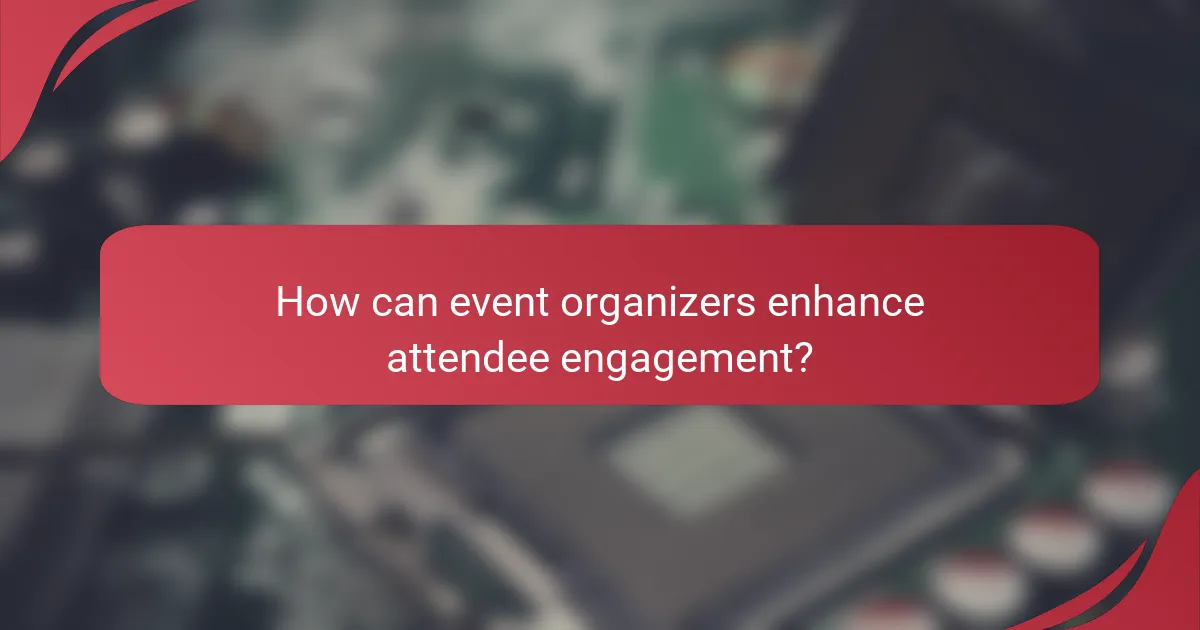
How can event organizers enhance attendee engagement?
Event organizers can enhance attendee engagement by incorporating interactive elements and leveraging technology. These strategies foster meaningful connections and encourage participation, making the event more memorable and productive for all involved.
Interactive sessions
Interactive sessions, such as workshops and panel discussions, encourage active participation from attendees. These formats allow for real-time feedback and discussions, which can lead to deeper insights and stronger connections among participants.
To implement interactive sessions effectively, consider using techniques like breakout groups or live polls. These methods can help gauge audience interest and adapt the content accordingly, ensuring a more tailored experience.
Networking apps
Networking apps facilitate connections before, during, and after the event by allowing attendees to share profiles and schedule meetings. These tools can significantly enhance engagement by providing a platform for attendees to connect based on shared interests or goals.
When selecting a networking app, look for features such as messaging, agenda sharing, and attendee matchmaking. Popular options include Whova and Brella, which offer user-friendly interfaces and robust functionalities to streamline networking efforts.
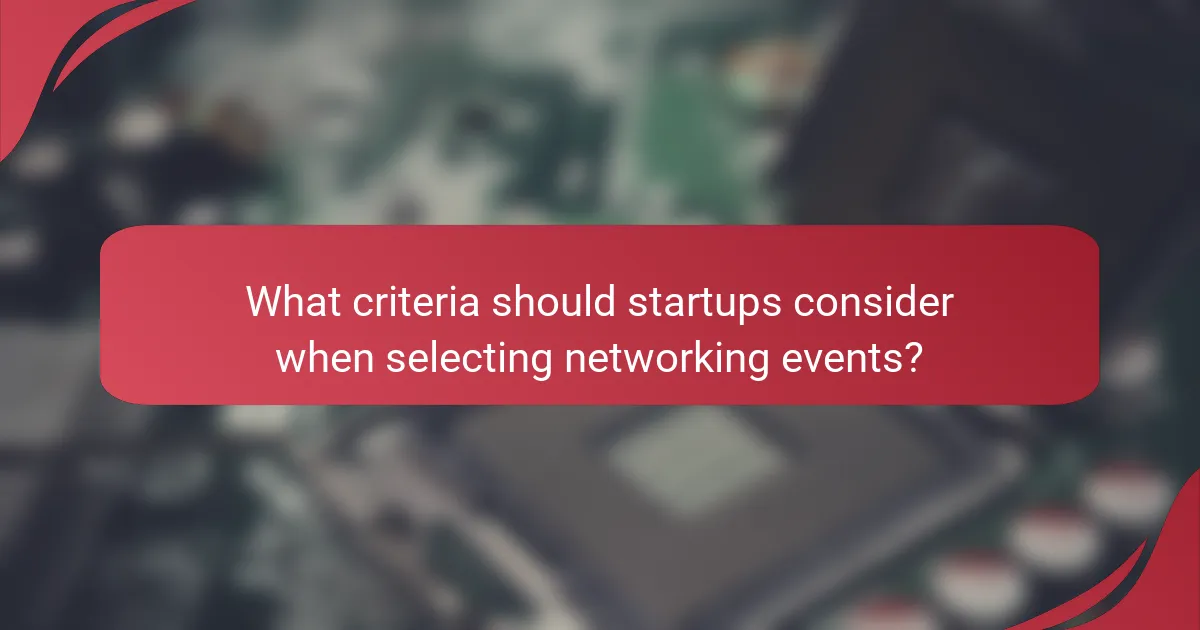
What criteria should startups consider when selecting networking events?
Startups should focus on several key criteria when selecting networking events, including industry relevance, audience demographics, and the potential for meaningful connections. Evaluating these factors can help ensure that the time and resources invested yield beneficial relationships and opportunities for investment.
Relevance to industry
Choosing events that align with your industry is crucial for maximizing networking potential. Look for gatherings that attract participants from your specific sector, as this increases the likelihood of meeting potential investors and partners who understand your market.
Consider attending industry-specific conferences, trade shows, or meetups. For example, a tech startup might benefit from events focused on innovation or venture capital, while a health startup should seek out healthcare-focused networking opportunities.
Audience demographics
Understanding the demographics of the event’s audience can significantly impact your networking success. Analyze the profiles of attendees, including their roles, backgrounds, and interests, to ensure they align with your startup’s goals.
For instance, if your startup is seeking funding, prioritize events where venture capitalists, angel investors, or industry experts are likely to attend. Utilize platforms like LinkedIn to research past attendees and gauge the event’s relevance to your target audience.
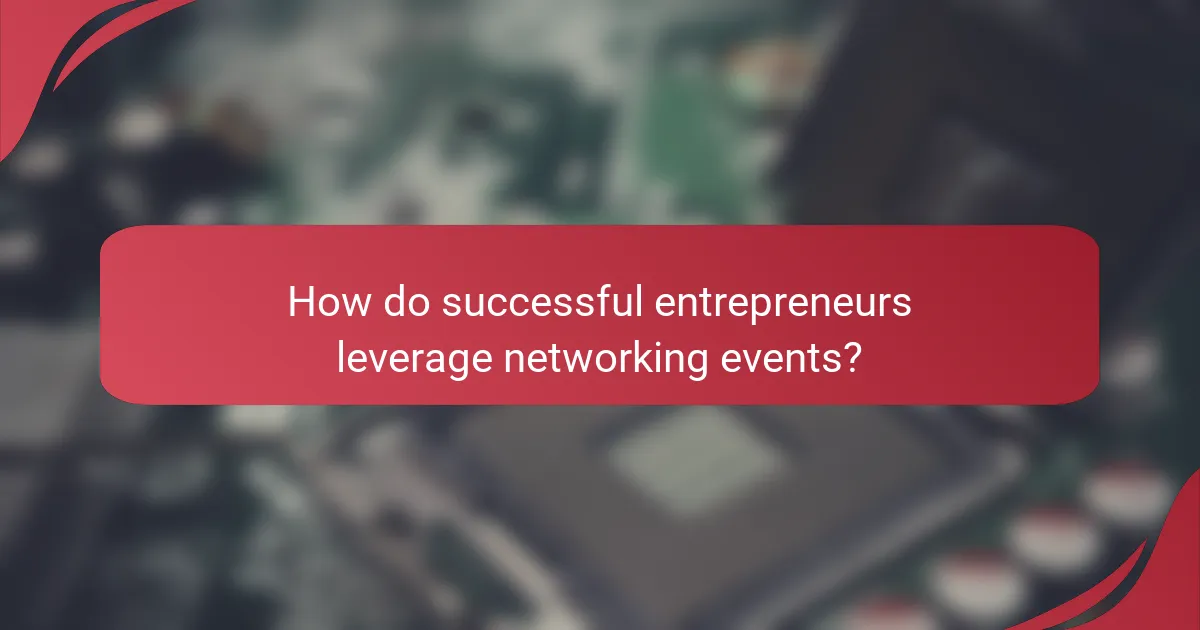
How do successful entrepreneurs leverage networking events?
Successful entrepreneurs utilize networking events to build valuable relationships and gain insights that can propel their businesses forward. By engaging with peers, mentors, and potential investors, they create opportunities for collaboration and funding that can significantly impact their ventures.
Building mentorship connections
Networking events are ideal for establishing mentorship connections that can guide entrepreneurs through various stages of their business journey. By approaching experienced individuals in their industry, entrepreneurs can gain insights, advice, and support that are crucial for growth.
To effectively build these connections, entrepreneurs should prepare thoughtful questions and express genuine interest in the mentors’ experiences. Following up after the event with a thank-you note or a request for further conversation can solidify these relationships.
Accessing funding opportunities
Networking events often serve as a platform for entrepreneurs to access potential funding opportunities. Investors frequently attend these gatherings to discover promising startups and innovative ideas, making it essential for entrepreneurs to present their business effectively.
To maximize funding chances, entrepreneurs should have a clear and concise pitch ready, highlighting their unique value proposition and market potential. Engaging in discussions and showcasing enthusiasm can attract investor interest, leading to further conversations about funding possibilities.
